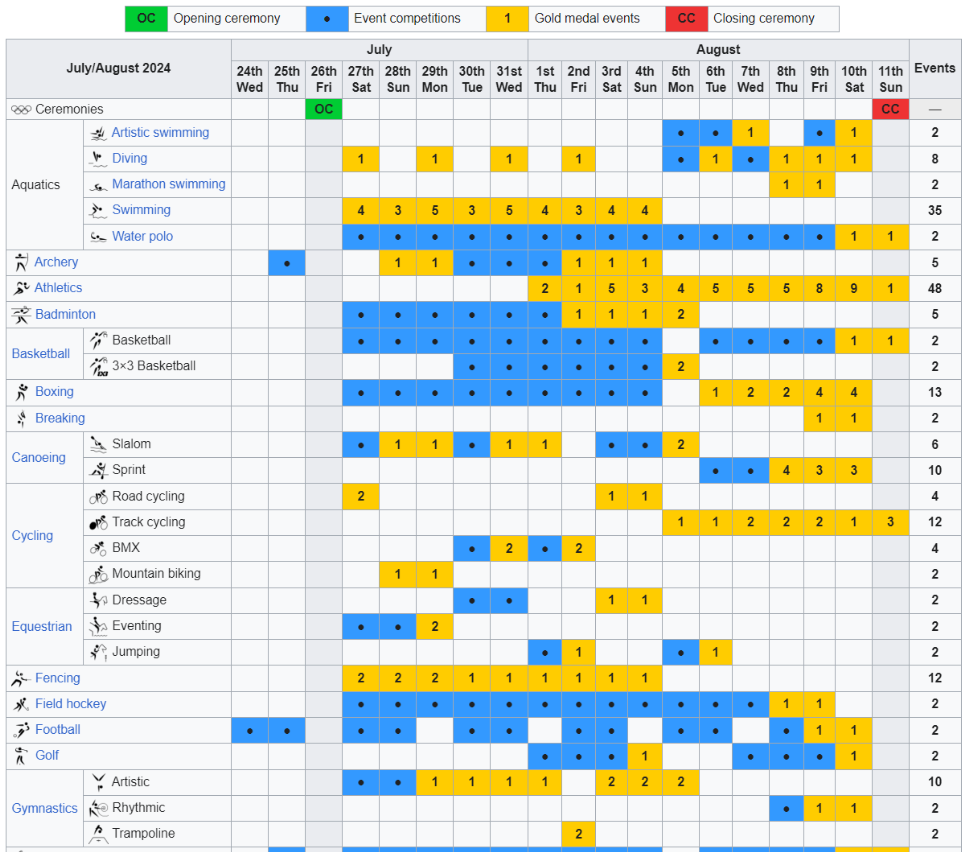Understanding the Olympic Schedule

The Summer Olympics is a global sporting event featuring thousands of athletes competing in various disciplines. Navigating the vast schedule of events can be challenging, but understanding its structure and key aspects can make the experience more enjoyable.
Daily Competitions
The Olympic schedule is structured around daily competitions, with events taking place across multiple venues throughout the day. The schedule is typically released several months before the Games, providing fans with a detailed overview of the events and their timings. Each day features a diverse range of sports, offering something for everyone.
Sport Categories, Breaking at the summer olympics schedule
The Summer Olympics encompass a wide range of sports, divided into categories. The categories include aquatic sports, athletics, cycling, gymnastics, team sports, and many others. Each category features several disciplines, such as swimming, diving, track and field, road cycling, artistic gymnastics, and basketball.
Time Zones
The Olympic schedule takes into account the time zones of the host city and the participating countries. Events are scheduled to ensure maximum audience reach, considering primetime viewing hours in key markets. This can result in events happening at various times throughout the day, depending on the location of the viewer.
Sample Daily Schedule
Here is a sample daily schedule, showcasing the types of events happening throughout the day:
| Time | Sport | Event | Venue |
|—|—|—|—|
| 8:00 AM | Swimming | Men’s 100m Freestyle | Aquatics Centre |
| 9:30 AM | Athletics | Women’s 100m Hurdles | Olympic Stadium |
| 11:00 AM | Gymnastics | Men’s Team All-Around | Gymnastics Arena |
| 1:00 PM | Cycling | Men’s Road Race | Cycling Course |
| 3:00 PM | Basketball | Men’s Quarterfinals | Basketball Arena |
| 5:00 PM | Volleyball | Women’s Semifinals | Volleyball Arena |
| 7:00 PM | Athletics | Men’s 100m Final | Olympic Stadium |
| 9:00 PM | Diving | Men’s 10m Platform Final | Aquatics Centre |
Factors Influencing Scheduling
Several factors influence the scheduling of events, including:
– Athlete availability: The schedule is designed to minimize conflicts and allow athletes to compete in their best possible condition.
– Venue capacities: The size and capacity of the venues play a crucial role in determining the number of events and spectators that can be accommodated.
– Broadcast considerations: The schedule is also influenced by broadcast rights and the desire to maximize television viewership in key markets.
Breaking News and Updates

The Olympic Games are a whirlwind of excitement, with athletes pushing their limits and records being broken. Breaking news is a constant during the Games, keeping viewers engaged and informed about the latest developments.
Types of Breaking News
Breaking news during the Olympics typically revolves around athlete performances, medal ceremonies, and unexpected events.
- Athlete Performances: These updates often involve record-breaking performances, upsets, and thrilling finishes. For instance, during the 2020 Tokyo Olympics, Simone Biles’ withdrawal from several events due to mental health concerns became a major news story, highlighting the importance of athlete well-being.
- Medal Ceremonies: The awarding of medals is a significant moment for athletes and countries. Breaking news coverage focuses on the winners, their reactions, and the significance of their achievements. For example, the 2016 Rio Olympics saw Michael Phelps win his 23rd gold medal, making him the most decorated Olympian of all time.
- Unexpected Events: The Games can be unpredictable, and unexpected events can generate significant news. These events can range from injuries and disqualifications to protests and political controversies. For instance, the 2014 Sochi Winter Olympics witnessed the doping scandal involving Russian athletes, which became a major international controversy.
The Role of Media
Media outlets play a crucial role in disseminating breaking news during the Olympics.
- Traditional Media: Television networks, radio stations, and newspapers provide live coverage, interviews, and analysis of the Games. These outlets often have dedicated teams of reporters and analysts stationed at the Games, ensuring prompt and comprehensive news coverage.
- Social Media: Platforms like Twitter, Facebook, and Instagram have become essential for disseminating breaking news. Athletes often use social media to share updates, photos, and videos, while news outlets use these platforms to reach a wider audience. Social media also allows for real-time discussions and reactions to breaking news events.
Examples of Recent Breaking News
Several breaking news stories have made headlines in recent Olympic Games.
- Simone Biles’ Withdrawal (2020 Tokyo Olympics): Simone Biles, a decorated gymnast, withdrew from several events citing mental health concerns. This story sparked discussions about the pressures athletes face and the importance of mental health awareness.
- Russian Doping Scandal (2014 Sochi Winter Olympics): A major doping scandal involving Russian athletes emerged during the Sochi Games, leading to widespread condemnation and sanctions. The scandal raised concerns about the integrity of international sporting events.
- Usain Bolt’s Triple-Triple (2016 Rio Olympics): Usain Bolt became the first athlete to win three consecutive Olympic gold medals in the 100m, 200m, and 4x100m relay races. His achievement was celebrated worldwide and solidified his status as a legend in athletics.
Impact of Breaking News on Spectators: Breaking At The Summer Olympics Schedule

Breaking news at the Olympics can have a significant impact on spectators, influencing their viewing experience, engagement with the Games, and even their perception of the events unfolding.
The Excitement and Anticipation of Breaking News
Breaking news often generates a surge of excitement and anticipation among spectators. When a major announcement is made, such as a sudden injury to a star athlete or a change in the competition format, it instantly elevates the drama and intrigue surrounding the Games. This can lead to increased viewership and social media engagement as fans eagerly seek updates and analysis. For example, the sudden withdrawal of Simone Biles from the Tokyo 2020 Olympics due to mental health concerns sparked widespread discussion and debate, creating a sense of uncertainty and anticipation for her future performances.
The Potential for Disappointment and Uncertainty
However, breaking news can also lead to disappointment and uncertainty. When a favorite athlete is forced to withdraw from competition due to injury or illness, it can be a devastating blow for their fans. Similarly, changes in competition rules or schedules can disrupt the viewing experience and leave spectators feeling frustrated. For instance, the postponement of the 2020 Tokyo Olympics due to the COVID-19 pandemic caused significant disappointment and uncertainty for athletes and fans alike.
The Impact on Betting and Engagement
Breaking news can have a profound impact on betting markets and other forms of engagement with the Games. Sudden changes in the competition landscape can lead to significant shifts in odds, prompting bettors to adjust their strategies. For example, a surprise upset in an early round of a competition can lead to a surge in betting activity on the underdog in subsequent rounds.
Examples of Breaking News Impacting the Games
Throughout Olympic history, breaking news has played a pivotal role in shaping the course of events.
- During the 1980 Moscow Olympics, the United States led a boycott of the Games in protest of the Soviet Union’s invasion of Afghanistan. This decision had a profound impact on both athletes and spectators, as many athletes were denied the opportunity to compete on the world stage.
- The 1992 Barcelona Olympics saw the reunification of Germany, which led to the creation of a unified German Olympic team. This event marked a significant moment in history and had a profound impact on the Games, symbolizing the end of the Cold War and the beginning of a new era of international cooperation.
Breaking at the summer olympics schedule – You know what’s worse than missing your favorite Olympic event because you’re stuck in traffic? Trying to explain to your friend why you’re watching synchronized swimming while they’re glued to the basketball game. It’s like trying to explain to Minnesota’s Governor Tim Walz why you need a new state park, only to be met with a blank stare.
But hey, at least the synchronized swimmers are always on point, unlike that time I tried to do a triple axel in my living room.
Trying to catch every single Olympic event is like trying to collect all those limited-edition McDonald’s collector meal cups – a near impossible feat! I mean, you can’t be in two places at once, unless you’re a time-traveling, teleporting ninja, and even then, you’d probably get disqualified for being too cool.